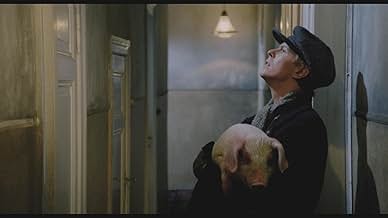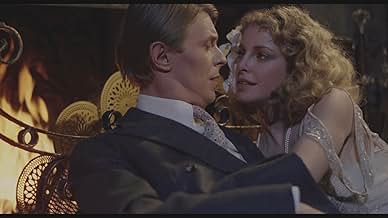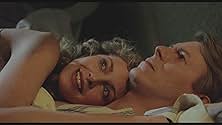IMDb RATING
5.4/10
1.2K
YOUR RATING
After World War I, a war hero returns to Berlin to find that there's no place for him--he has no skills other than what he learned in the army, and can only find menial, low-paying jobs. He ... Read allAfter World War I, a war hero returns to Berlin to find that there's no place for him--he has no skills other than what he learned in the army, and can only find menial, low-paying jobs. He decides to become a gigolo to lonely rich women.After World War I, a war hero returns to Berlin to find that there's no place for him--he has no skills other than what he learned in the army, and can only find menial, low-paying jobs. He decides to become a gigolo to lonely rich women.
Evelyn Künneke
- Frau Aeckerle
- (as Evelyn Künnecke)
Bela Ernyey
- Von Lipzig
- (as Bela Erny)
Featured reviews
Believe it or not, this was David Bowie's first acting role in a motion picture, despite the fact that this film was released a year after THE MAN WHO FELL TO EARTH. A large portion of this film was destroyed in a fire, so it took director Hemmings nearly three years to piece together a motion picture out of what remained. With that in mind, this is a remarkable film, and one can't help but wonder what the finished product might have been like had it not been for the fire. For what is most intriguing about this film is the use of real footage of the Weimar Republic Germany in all its glorious decadence and decay. Whether this footage was used to buffer the missing footage or planned from the beginning, I guess we'll never know, but it brings an invaluable air of absurdity and black humour to what is already a pretty outrageous film. All the performances are great, especially Bowie, who really is one of the most underrated film talents out there. And the music score, which features some of the glorious songs from that era, as well as the irresistible theme song from Miss Dietrich, is fantastic! If anyone knows where I can get a copy of the soundtrack, let me know!
I'd heard for ages that this was pretty bad, and that Bowie was embarrassed by it. However, as it showed up on BFI subscription (i.e. Free to me) I thought I'd give it a go.
Simply stated, I can see why the reviews were awful at the time. There is a fair bit to enjoy also, though, so worth a look.
IMHO the main issue is that the tone is all over the place - some scenes are clearly played for laughs (heavily signalled by the "oom-pah" score) even if they are not funny. On the other hand, some bits really *are* funny. The balance between the nazism and the nightclub scenes is however much better handled in Cabaret (of course). Some reasonable acting therefore gets a bit lost along the way.
Bowie himself looks a bit stiff and awkward much of the time - something that worked much better in the context of The Man Who Fell to Earth than it does here.
Simply stated, I can see why the reviews were awful at the time. There is a fair bit to enjoy also, though, so worth a look.
IMHO the main issue is that the tone is all over the place - some scenes are clearly played for laughs (heavily signalled by the "oom-pah" score) even if they are not funny. On the other hand, some bits really *are* funny. The balance between the nazism and the nightclub scenes is however much better handled in Cabaret (of course). Some reasonable acting therefore gets a bit lost along the way.
Bowie himself looks a bit stiff and awkward much of the time - something that worked much better in the context of The Man Who Fell to Earth than it does here.
When the fastidious "Lt. Paul Przygodski" (David Bowie) returns to Berlin society after the end of the Great War, he finds that things have profoundly changed and that his skills - such as they are - are not going to help him make much of a living. What he does have, though, is looks. He can easily turn an head or two when he walks into a room and so quickly realises that he can make some money "entertaining" the wealthier class of lady - already married or not, or even the occasion gentleman. As the Weimar Republic starts to give way to embryonic Naziism, the story also attempts to take a more serious track attempting to illustrate the profound societal changes in the city and the country whilst he and his clientele attempt to stay aloof and immune from the increasing anger and intolerance on the streets. It's really that attempt at the political that spoils this. Had it been left as a seedy story of a man using his beauty and, to an extent, his brains to get on in life then it have made for a decent watch. It doesn't though, it meanders all over the place mixing it's themes and delivering something that doesn't quite seem to know where it wants to go or who it's for. There's a decent enough effort from Sydne Rome as maybe the only honest woman in his life "Cilly" and there's a charming cameo from Marlene Dietrich who just about manages to, almost breathlessly, sing the title song but the rest of the cast seem underused and their characterisations undercooked to the point where I began to wonder if the likes of Kim Novak and Curd Jürgens just owed director David Hemmings a favour. It has it's moments, but just not quite enough of them and it does show up Bowie as rather wooden.
This is one of the most unusual films I have ever seen. It's an offbeat, sensitively filmed look at Weimar Germany in a sort of parallel-universe version. "Cabaret" it is not! If you ever get a chance to see it, I don't want to spoil the ending for you . . . but when you see it, you'll say to yourself, "Of course! Why didn't I foresee that coming?!?" David Bowie plays a sort of innocent ne'er-do-well discharged from the German army after World War I and drifting through existence; he can't find anything to do with himself except hire himself out as a "gigolo" for rich, proto-Eurotrash war widows in ballrooms where they "dance to forget". Bowie's father is a once-domineering tyrant who has been silenced by a stroke. Bowie tries to break the news to him that he has descended so far as to play the gigolo, a betrayal of his father's macho ideals, but Dad only sits in stony silence -- a disturbing scene. Bowie plays a poor lost soul. As Western civilization decays all around him, a sinister character stalks him and tries to gain control over him; this bloke is vaguely homosexual (only suggested), and one of his lines is a real groaner of a double-entendre: "We will have you in the end!" Marlene Dietrich is the center of romantic gravity in this story; she sadly, sweetly tells Bowie the raison d'etre of forlorn women dancing with gigolos in the ballrooms -- the only way to assuage loss and stave off despair. Then she performs the song "Just a Gigolo", bringing out all the heartbreak from its depths. The end of the film is dark and truly chilling. Go see it if you can!
Above, a previous post makes the claim, "Believe it or not, this was David Bowie's first acting role in a motion picture, despite the fact that this film was released a year after THE MAN WHO FELL TO EARTH. A large portion of this film was destroyed in a fire, so it took director Hemmings nearly three years to piece together a motion picture out of what remained." Don't believe it. This story is a total fabrication.
All available contemporary sources reveal that "The Man Who Fell To Earth" was shot in 1975, and a simple viewing will attest to the fact that Bowie's physical appearance is of the 1975/1976 era of his career. Contemporary sources also show that "Just a Gigolo" was shot Berlin in 1978, and its initial running time was 147 min. upon its November, 1978 release in German cinemas. It was soon pulled from release because of poor reviews, and it was *intentionally* cut down to shorter lengths for its various international releases, not because of accident by fire.
All available contemporary sources reveal that "The Man Who Fell To Earth" was shot in 1975, and a simple viewing will attest to the fact that Bowie's physical appearance is of the 1975/1976 era of his career. Contemporary sources also show that "Just a Gigolo" was shot Berlin in 1978, and its initial running time was 147 min. upon its November, 1978 release in German cinemas. It was soon pulled from release because of poor reviews, and it was *intentionally* cut down to shorter lengths for its various international releases, not because of accident by fire.
Did you know
- TriviaThe last on-screen appearance by Marlene Dietrich. German press reports claimed she was paid $250,000 for two days' work.
- Crazy credits"And featuring, with great pride, MARLENE DIETRICH"
- Alternate versionsThe original European version ran a full 147 minutes. The U.S. version was cut to 105 minutes. Only this version is available on video (Water Bearer Films Video) in the United States.
- ConnectionsFeatured in Marlene (1984)
- SoundtracksJust a Gigolo
(Schöner Gigolo, armer Gigolo)
Music by Leonello Casucci
German lyrics by Julius Brammer
English lyrics by Irving Caesar
Sung by Marlene Dietrich
- How long is Just a Gigolo?Powered by Alexa
Details
- Runtime2 hours 27 minutes
- Sound mix
- Aspect ratio
- 1.66 : 1
Contribute to this page
Suggest an edit or add missing content


































